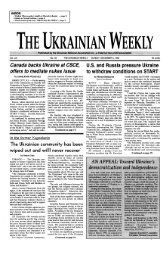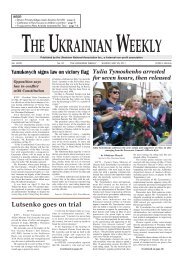Kyiv - The Ukrainian Weekly
Kyiv - The Ukrainian Weekly
Kyiv - The Ukrainian Weekly
Create successful ePaper yourself
Turn your PDF publications into a flip-book with our unique Google optimized e-Paper software.
6 THE UKRAINIAN WEEKLY SUNDAY, JANUARY 17, 1999No. 3THE UKRAINIAN WEEKLYEighty years agoBefore Ukraine’s Parliament adopted the Act of Declaration of the Independenceof Ukraine on August 24, 1991, <strong>Ukrainian</strong>s around the world faithfully celebratedJanuary 22 as Independence Day. Indeed, what started as local observances grewinto national events, with <strong>Ukrainian</strong> businesses and schools being closed in honor ofthe day and government officials issuing proclamations on the occasion – the netresult being that the dream of <strong>Ukrainian</strong> independence was kept alive.<strong>The</strong>n, soon after the 1991 proclamation of independence, which was confirmedby the people of Ukraine in a nationwide referendum later that year, the governmentof Ukraine declared that August 24 would be celebrated as <strong>Ukrainian</strong> IndependenceDay. <strong>The</strong> diaspora followed suit.This year, however, is a particularly important anniversary of our original<strong>Ukrainian</strong> Independence Day, as it marks the 80th anniversary of the January 22,1919, Act of Union that joined all <strong>Ukrainian</strong>s lands into one <strong>Ukrainian</strong> NationalRepublic. <strong>The</strong> act came one year to the day after the <strong>Ukrainian</strong> National Republichad been declared in <strong>Kyiv</strong> and two months, three weeks after independence wasproclaimed in western Ukraine on November 1, 1918.This historic union occurred at a time of great chaos: the collapse of authority,social turmoil and war (during this period six different armies occupied <strong>Ukrainian</strong>territory). It came after the <strong>Ukrainian</strong> National Rada, the representative assembly ofthe Western <strong>Ukrainian</strong> National Republic, voted on January 4, 1919, in Stanyslavivto unite with their compatriots in <strong>Kyiv</strong>. <strong>The</strong> official Act of Union was proclaimed onJanuary 22 in St. Sophia Square in <strong>Kyiv</strong>, and was confirmed by the Labor Congress,the de facto <strong>Ukrainian</strong> Parliament, six days later.To be sure, this <strong>Ukrainian</strong> independence did not last long, falling victim to variousinternal factors (inexperience of political leaders, and, most significantly, thefact that state-building began while nation-building was in its infancy) and externalelements (the superior military forces of Poland in the west and Bolshevik Russia inthe east, and the inability of the <strong>Ukrainian</strong>s to secure theEntente’s recognition).Two historians, authors of recently published histories of Ukraine, argue that the<strong>Ukrainian</strong> revolution was not a failure, however.Orest Subtelny underlines: “National consciousness, which had been limited to apart of the intelligentsia, spread to all segments of <strong>Ukrainian</strong> society” and “the riseof <strong>Ukrainian</strong> governments taught peasants to identify themselves as ‘<strong>Ukrainian</strong>s.’ ...[Thus] the upheaval of 1917-1920 was not only a socioeconomic but also a nationalrevolution.”Paul R. Magocsi argues that “even if these efforts did not bring about the hopedforindependence, the revolutionary experience itself instilled in <strong>Ukrainian</strong>s a firmsense of national purpose, achieved, moreover, not after several generations ofpeacetime cultural work, but in less than half a decade. From such a perspective, the<strong>Ukrainian</strong> revolution was a remarkable success.”So, as the 80th anniversary date of the Act of Union approaches, it is fitting toask: which independence day should be celebrate? Surely, the answer is August 24.However, can we forget the historic events of January 22, 1918, November 1, 1918,and January 22, 1919, and we might add, June 30, 1941, when a short-lived<strong>Ukrainian</strong> state was announced by the faction of the Organization of <strong>Ukrainian</strong>Nationalists led by Stepan Bandera? Just as surely, the answer is “no.”All these dates in the history of the homeland to which we trace our roots are significant;all were steps on the way to the independence ultimately achieved onAugust 24, 1991, and confirmed overwhelmingly by the multi-ethnic population ofUkraine in a plebiscite on December 1, 1991. Let us mark this milestone anniversary,then, by reflecting on where Ukraine has been and where it is headed.January171869Turning the pages back...<strong>The</strong> name of Ivan Trush is synonymous with western<strong>Ukrainian</strong> painting, his stature equalled only by OleksanderNovakivsky. His impressionistic landscapes seem at once indescribablyfamiliar and uncannily idiosyncratic.Trush was born on January 17, 1869, in Vysotske, a village in Brody county about 60miles east of Lviv. He studied at the Krakow Academy of Fine Arts from 1891 to 1897,then moved to Lviv, where he was active in <strong>Ukrainian</strong> community life and artistic circles.He married Mykola Drahomanov’s daughter, Ariadna, and was a close friend of thewriter and scholar Ivan Franko.His first solo show was held in Lviv in 1899. That year he also participated in the firstexhibition organized by the Society for the Advancement of Ruthenian Art, founded in1898. In 1904, together with the historian Mykhailo Hrushevsky, he founded the Societyof Friends of <strong>Ukrainian</strong> Scholarship, Literature and Art, and that summer organized aschool for <strong>Ukrainian</strong>s from the Russian Empire. <strong>The</strong> following year he founded and copublishedthe first <strong>Ukrainian</strong> art magazine, Artystychnyi Vistnyk, also serving as its editor.Trush contributed articles on art and literature to journals such as Literaturno-Naukovyi Vistnyk, Moloda Ukraina and Ukrainische Rundschau, as well as the newspaperDilo. Trush also travelled widely, visiting <strong>Kyiv</strong> on several occasions (where he lecturedat Mykola Murashko’s school in 1901), living briefly in Crimea (1901-1904),sojourning in Italy (1902, 1908) and travelling to Egypt and Palestine (1912).Trush painted over 6,000 works, noted, according to Sviatoslav Hordynsky, for hisoriginal use of color. He is known primarily for his landscapes and genre paintings offolk scenes, but also painted portraits for the Shevchenko Scientific Society, producinglikenesses of Volodymyr Antonovych, Mykola Drahomanov, Ivan Franko, BorysHrinchenko, Mykhailo Hrushevsky, Mykola Lysenko, Cardinal Sylvester Sembratovych,Vasyl Stefanyk and Lesia Ukrainka.Trush died in Lviv on March 22, 1941.Source: “Trush, Ivan,” Encyclopedia of Ukraine, Vol. 5 (Toronto: University of TorontoPress, 1993).NEWS AND VIEWSOur community and the press:showcasing our strengthsby Alexander B. Kuzma<strong>The</strong> recently convened <strong>Ukrainian</strong> WorldCongress adopted the slogan “A StrongDiaspora – A Strong Nation.” If taken literally,the slogan seems to miss the mark.Neither Ukraine nor the diaspora are nearlyas strong as we would like to see thembecome. Still, the vision of a strong nationand a strong diaspora is something weurgently need to cultivate. Instead oflamenting the degree to which Ukraineand we ourselves have fallen short of ourloftiest dreams and expectations, the congresschallenged us to keep the dreamalive, to defy our nagging fatalism, to seeour glass as half full, but not empty orbereft of promise.At a time when too many of our traditionalleaders seem resigned to aninevitable decline in our community institutions,the <strong>Ukrainian</strong> World Congress andlast year’s <strong>The</strong> Year 2020 Conference inNew Jersey encouraged us to take a freshlook at our potential, to recognize ourstrengths, to build on those strengths, andto articulate a vision for the future.A critical element that typically isabsent from our community life is thedevelopment of an effective media strategy.We would love to see the worldacknowledge the beauty of <strong>Ukrainian</strong> artand culture, to know more about theTerror-Famine, about Chornobyl, about thevalor of our national martyrs and the heroismof our forefathers. We would love tosee the media give proper credit to thecontributions <strong>Ukrainian</strong>s have made in thefields of science, literature and business.But for some infuriating reason, we thinkit’s the media’s job to find us rather thanour job to reach out to the media and makesure that our story gets told. Nothingbetrays the diaspora’s low self-esteem asmuch as its failure to aggressively pursueoutside media coverage of its activities.<strong>The</strong> seventh conclave of the <strong>Ukrainian</strong>World Congress was a glaring case inpoint. According to several organizers withwhom I spoke, there was never anyattempt made to attract the Canadian orinternational newsmedia to the Decembercongress. For the life of me, I can’t understandwhy.<strong>The</strong> <strong>Ukrainian</strong> World Congress was agolden opportunity to draw attention to the<strong>Ukrainian</strong> diaspora, to showcase its diversity,its resiliency, its valiant effort to overcomecenturies of oppression by keepingits heritage and culture alive. At its height,there were over 500 delegates from 13countries around the world – some from asfar away as Argentina, Brazil andAustralia.Multiculturalism is a hot topic inCanada these days, and for journalists andfeature writers looking for some new“angle” to cover, here was a treasure troveof fascinating subtexts to explore:1) the changing role of the diaspora insupporting an independent Ukraine;2) the common bonds and the contrastamong persons of <strong>Ukrainian</strong> origin livingin Canada, Brazil, Poland and Russia;3) exposure of discriminatory policiesand persecution inflicted upon ethnic<strong>Ukrainian</strong>s in Russia, Poland and Slovakia(coupled with a sidebar on religious andethnic tolerance, which is prevalent inUkraine today);4) the efforts of <strong>Ukrainian</strong> women’sorganizations to combat international sexAlexander B. Kuzma is director of developmentfor the Children of ChornobylRelief Fund.slave trafficking and to elevate the statusof women in post-Soviet society (thiswould have tied in perfectly with an articlethat ran in the Toronto Sunday Star on thefinal day of the Congress);5) the impressive variety and potentialimpact of humanitarian aid and technicalassistance programs marshalled by<strong>Ukrainian</strong> organizations around the globe;6) the challenges facing our communityin attracting younger, more professionalcadres to our ranks.<strong>The</strong> list goes on.<strong>The</strong>re were human interest storiesgalore: Ivan Drach, Yaroslava Stetsko,people at the center of Ukraine’s strugglefor a political and cultural renaissance.Even on the most parochial level, the<strong>Ukrainian</strong> World Congress could haveexploited the “local angle” by appealing tothe pride of Toronto’s business elite and itsmedia who rightly boast that Toronto hasbecome one of North America’s mosturban cities. Here was Toronto provingonce again that its reputation as an internationalmecca is well-deserved, as it hostedan important gathering of <strong>Ukrainian</strong>s fromaround the world to discuss the fate ofEurope’s cornerstone nation.Surely, this was a newsworthy event forsomeone other than <strong>The</strong> <strong>Ukrainian</strong><strong>Weekly</strong>. <strong>The</strong> <strong>Weekly</strong> is a precious sourceof information for our community, but itcannot be expected to reach the millions ofCanadians who read the Toronto Globeand Mail. Yet five days went by with nopress conference or press release to alertthe rest of the world that such a congresswas under way. As far as the Canadianpublic and news services were concerned,the congress never happened! It was utterlyand inexcusably invisible.<strong>The</strong>re are those who enjoy blaming thepress for its failure to cover our communityevents when we have only ourselves toblame. With thousands of potential newsstories vying for the attention of assignmenteditors each day, we cannot expectour programs to get automatic coverage.We must take the initiative to go out and“make the story happen.” Even in theabsence of a sophisticated press strategy,there is a simple set of mechanical stepswe can follow to achieve at least modestsuccess:• appoint a press coordinator and makehim/her accountable for systematic andassertive outreach to the mainstream press;• prepare a press release at least fivedays before the event is to take place;• make follow-up phone calls to makesure that the event in question is on theeditors’ radar screen and not simply buriedunder a stack of 50 competing bulletinsand faxes.<strong>The</strong>re is a fourth principle that shouldbe adhered to: <strong>Ukrainian</strong> organizationsneed to get into the habit of cultivatingrelationships with individual reporters andeven editors in their local communities,testing their receptiveness to various newsstories. As we enter into an ongoing dialogueand gain a better understanding ofeditors’ priorities, we will learn how toexpress our concerns and articulate ourvision from their perspective.Whether our press releases are ignoredor not, we need to constantly remind themedia that Ukraine is one of the mostimportant countries in the world. Some ofthe most respected foreign policy gurus,from Henry Kissinger to ZbigniewBrzezinski have called it “the strategiclynchpin” of the former Soviet Union.(Continued on page 12)

















